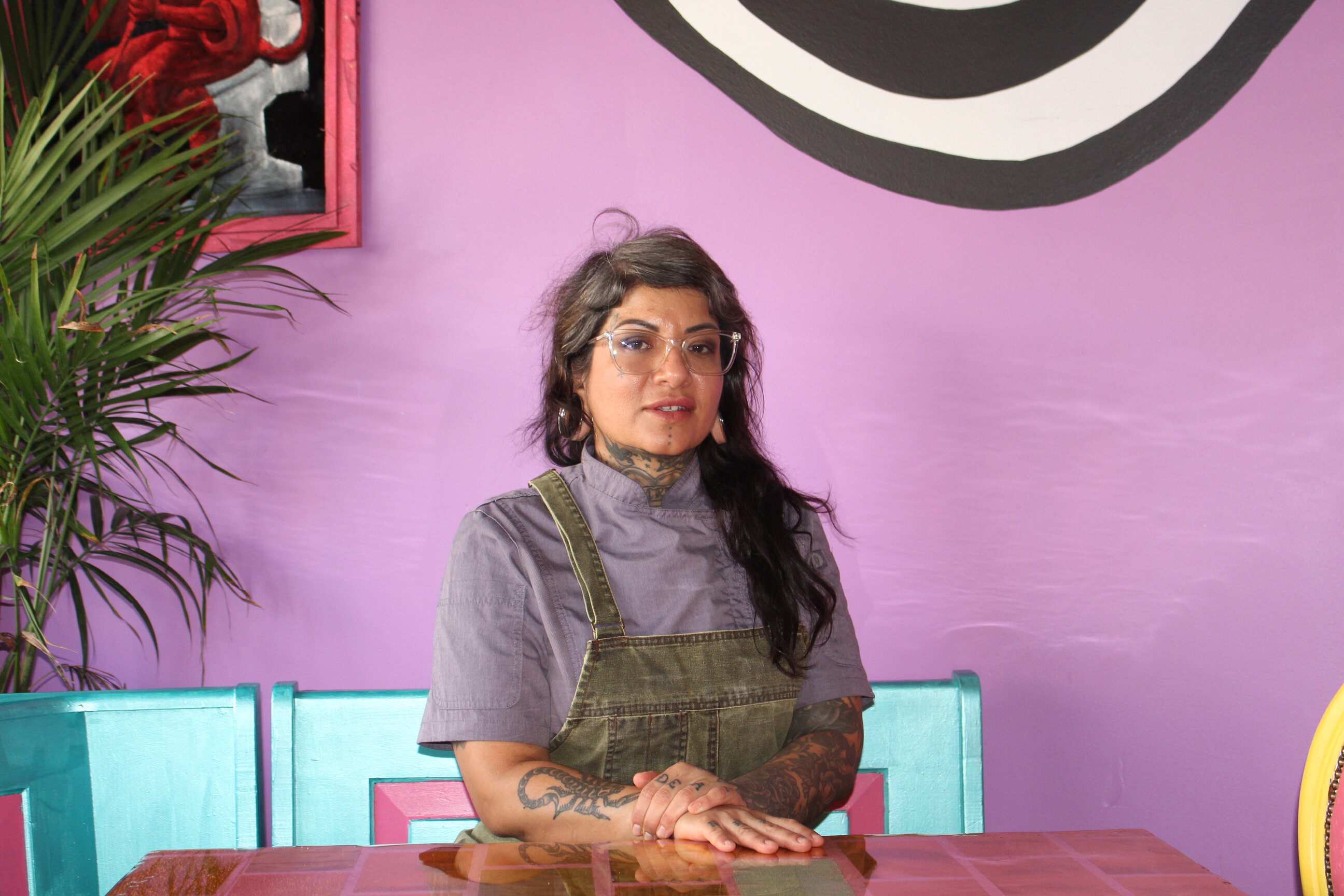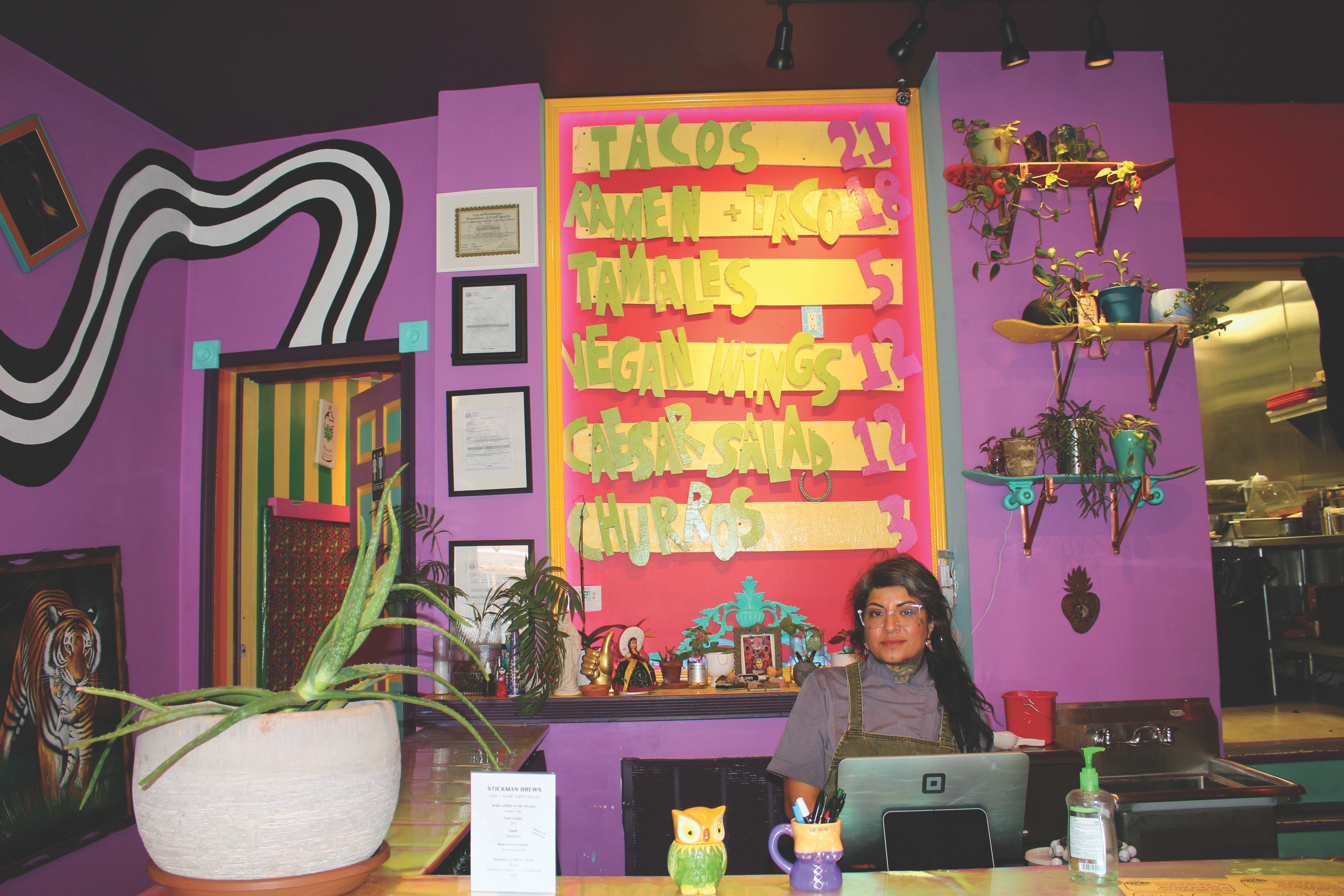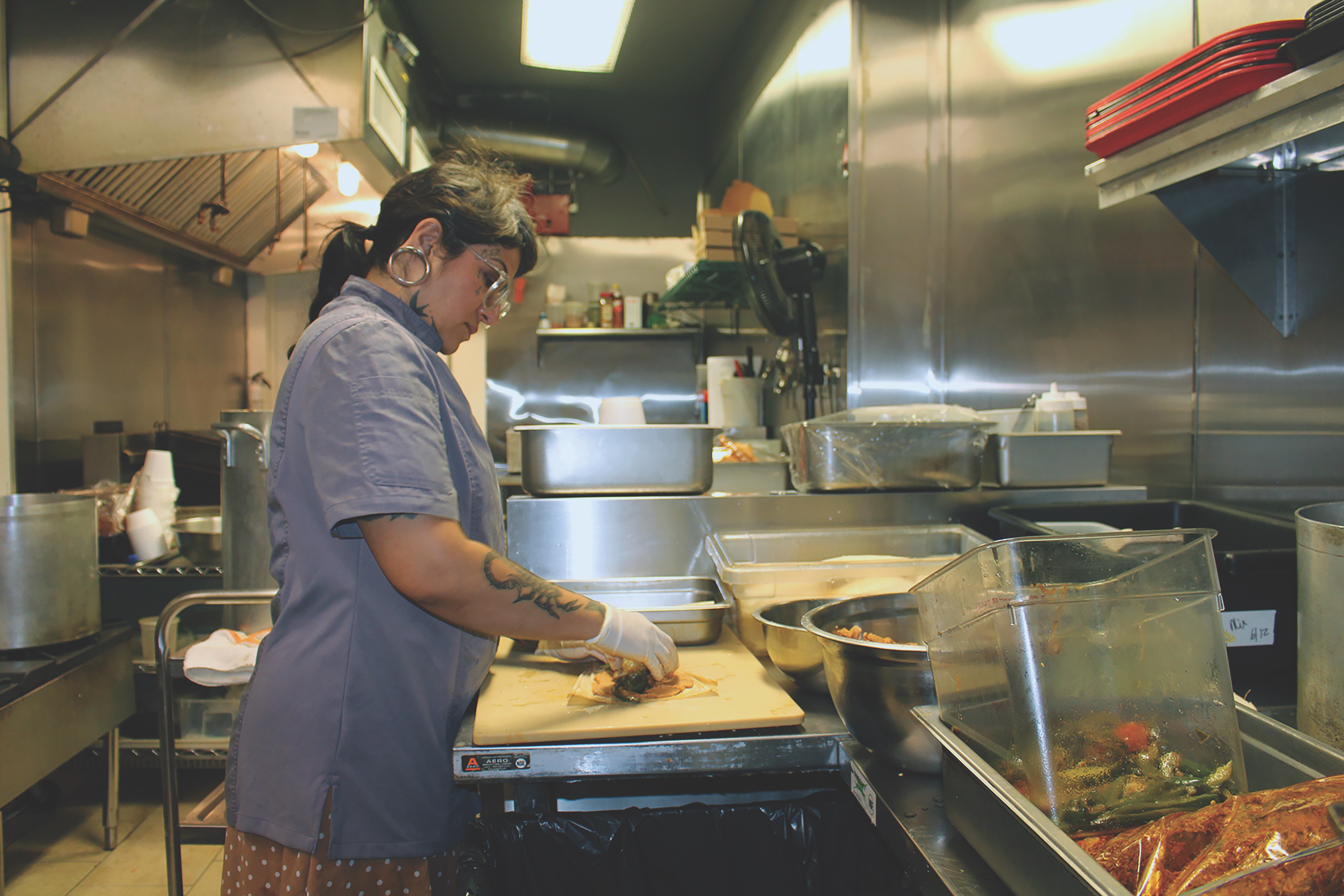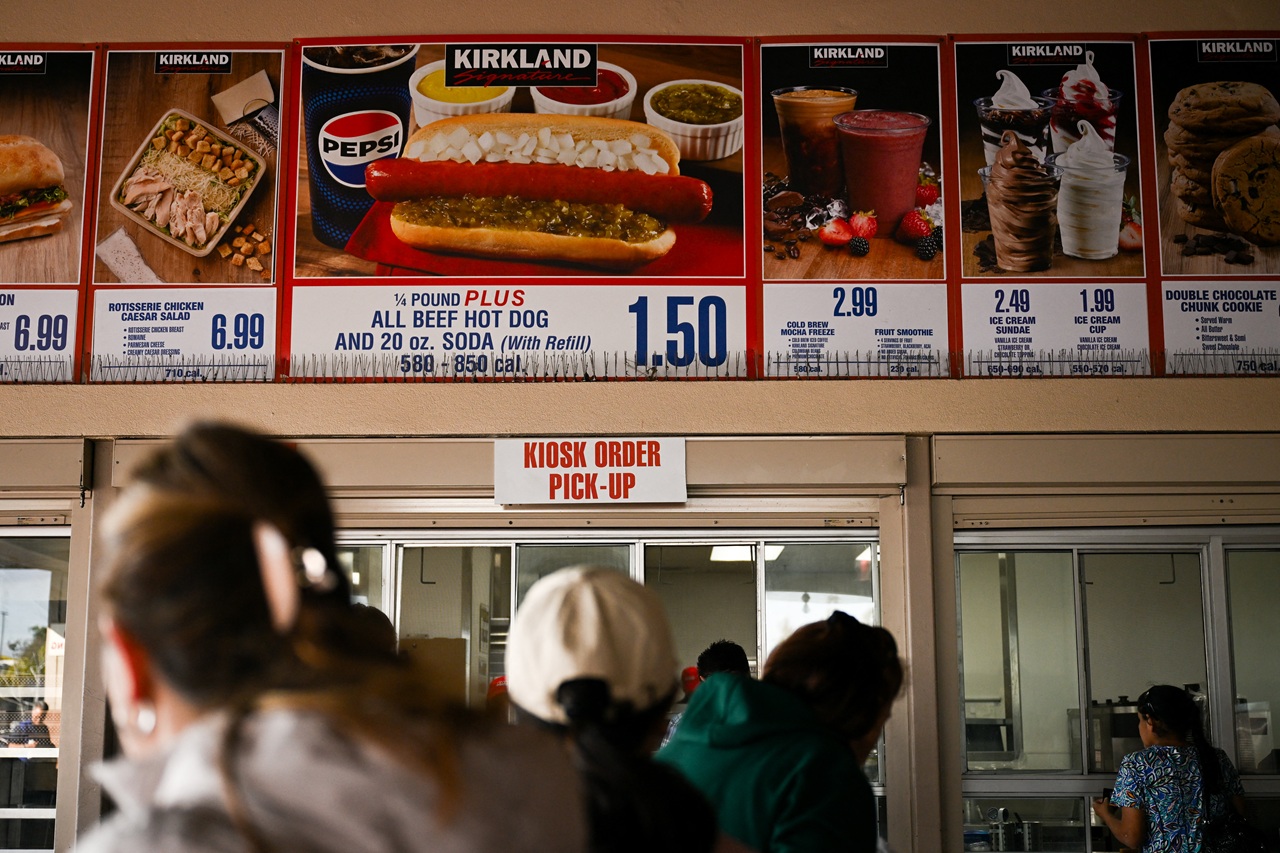
Jennifer Zavala's Unconventional Culinary Journey
From growing up in Billings to waitressing in Connecticut, Jennifer Zavala has become a household name in Philly as a restaurateur.
Juana Tamale anchored on Passyunk Ave. is a no fuss eatery with on-the-go workers, vibrant fuschia-purple paint, gold dusted tables. There is no surprise Jennifer Zavala’s eatery has gained the attention of Philly foodies.
Although she has a successful career purely because of talent, hard work, and severe dedication, she had to endure many sexist comments from former colleagues and customers who told her that she wasn't capable of making it into the competitive culinary world.
However, she defeated those odds and worked hard for over two decades to get to where she is now.
“I don't have a conventional story, a story that everyone has,” Zavala said.

From Billings to big moves
Zavala was born in Billings, Montana, to a father of Mexican heritage and a mother who was Bulgarian and Russian. Growing up in Montana, her father’s family would often make big batches of Mexican dishes.
Some of her earliest memories were of her eating dishes her grandmother made for her, such as harina de bunuelos and refried beans.
“My father was Mexican and a lot of his family was there, my aunts, my grandmother and uncle, and my aunt had a restaurant called Mamacitas. Mamacitas [had] just this very, counter diner vibe to it and near the Billings fairgrounds there were a lot of truckers that would come in and eat,” Zavala said in an AL DÍA interview.
The vivid memories of Zavala’s family cooking with different spices, an array of chiles, and deep fried goodness is what made her family dishes remarkable during family gatherings.
When her parents divorced, Zavala’s mother and her moved to Connecticut. However, through the memories that she had of her dad and his family, the cooking and the food is what most traveled with her while growing up living in New England.
As she grew up, she became restless and wanted to get back to her true roots, which was, of course, cooking.
“I started working in restaurants; the security that I found in cooking in restaurants kind of pushed me into what our mind kind of staples and the flavor and its always been Mexican food,” she explained.
Her first shot in the restaurant business came about when she began waiting tables at a quaint vegan and vegetarian cafe in Middletown, Connecticut.
“It wasn't really a big thing,” said Zavala. “People had this kind of stigma when it came to that kind of food. It was an all-woman kitchen and I absolutely longed to be a part of that.”
Zavala knew that in order to be a part of the culinary game, she needed to show what she could do, however, she had a long way to go.
She began working at a concert venue called Webster's Theater in Hartford, Connecticut. She worked in production, but during her free time she would make different dishes and feed bands that would play.
Zavala began traveling across the country. However, she decided to grow some roots in California, once again immersed in Mexican cuisine, which led her to open a restaurant called Cha’s Cha’s in Long Beach, California.
In the midst of her brand new restaurant, Zavala discovered that she bit off more than she can chew.
“It was very large, it was too large. I knew how to cook and I did not know how to run a business, those are two different things,” she said. “I was young and I didn't know what I was doing.”
Heading back to the East Coast
Not long after, Zavala found herself heading back to the East Coast. She became a mother and moved to New Jersey, where her son’s grandfather became sick. The move to the Garden State wasn't easy, so she moved to Philly.
Philly, known for its many layers of Latino cuisine, including Mexican, she decided to stay in the city, which meant that she could set her foot in different restaurants.
Zavala admits that she may have fibbed a little bit in order to learn different trades in the kitchen, like chopping onions for instance. She did not know what she was doing.
“They would tell me to come in and I didn’t know what I was doing so I would tell the chef, ‘Ok, show me how you cut these onions,’ and when they showed me I would literally stare intensely because I only had one shot,” she admitted. “So that was my trick, that was how I learned how to cook.”
She met Owen Kamihira, a restaurateur in Philadelphia, and they began discussing opening El Camino Real. They wanted to give the eatery a rustic, Tex-Mex feel, so they decided to travel down South to Mexico and visited different cities like Ciudad Juárez and Chihuahua.
After El Camino, Zavala had a stint in Top Chef. She then started working at Amada, alongside world renowned chef Jose Garces. Her next gig was at Xochitl in Society Hill.

“I thought that after Top Chef, that I would just take off and it wasn’t that,” she stated.
Becoming her own boss
Zavala began seeing how the restaurant industry lacked diversity. She felt that she did not belong in the Philly restaurant industry.
“There were a lot of white men everywhere. And dealing with the patriarchy and the cliques, people asking you where did you work? And if you didn't, if you don't know who some of these chefs are, then you aren't seen as being successful or of quality,” she said.
The opportunity to be her own boss was on the line when she began selling her homemade tamales through a food truck.

“I didn't ever think the tamale thing was gonna pick up, but it did and I needed a bigger space,” said Zavala.
Luckily, one of her friends let her use a kitchen at the concert venue Underground Arts in Spring Garden where she began selling dozens of tamales during concerts and shows. People got wind of her tamales, which gave her more customers.
But what was lingering around the corner was the COVID-19 pandemic.
RELATED CONTENT
Through days of brainstorming, Zavala developed a concept with Underground Arts where they sold cocktails to go and she sold birria, a traditional meat dish from the Mexican state of Jalisco.
“The first one was a dud because no one knew about the pop-up,” said Zavala. “I started posting on Instagram, it was getting busier.”
Zavala’s birria received positive feedback all over Philly, which led her to collaborate with other well-known eateries. She did pop-ups with Pizza Jawn, where they sold over 150 birria strombolis in a three-hour span.
The Beginning of Juana Tamale
Still, Zavala was determined to start a new chapter in her professional life. So in May 2021, Zavala signed a three-year lease of a property located right in the center of Passyunk in South Philly.
However, it was never really her intention to commit to something as big as opening a brick and mortar.
“This was only appealing to me for only a few reasons,” said Zavala. “I live really close by and my sons can come here. I can run home when I need to.”
Juana Tamale’s officially opened in July 2021, with the name being more unique than the dishes served.
“My dad calls me Juana, he doesn't call me Jennifer,” she stated. “My dad called me one day, and and just said, ‘Juana,’ I just got that idea, Juana Tamale.”

With a bigger kitchen and a handful of employees, Zavala can now produce different kinds of dishes that she has learned how to make throughout her culinary journey, including foods from her Mexican heritage.
Zavala loves to switch up her menu, but two dishes will always remain. The first are her famous birria tacos. She takes pride in using local ingredients to make her tortillas and masa.
Switching up the tamale game
Another famous staple at Juana Tamales is, of course, her tamales.
“My husband and I have friends who have a farm out in Fallsington, Pennsylvania, and I asked them to grow this Oaxacan green corn and they did,” said Zavala. “They grew eight acres of it and I have 800 pounds of Oaxaca green corn for tamales.”
Zavala always tries different fillings for her tamales, like poblano and onion, chicken, and even bacalao tamales that she made at her Volver residency.
“I plan on making oyster tamales, to just have fun with it.”

Zavala knows she gets a lot of slack for her prices; however, she doesn't mess around when it comes to the financial importance of her employees.
“A lot of people are upset about my prices, people are upset that I include a 20 percent gratuity and I am upset that people have to continuously see that minority food has to be cheap,” she said.
Despite the backlash, it's safe to say that Zavala isn't going anywhere.











LEAVE A COMMENT: